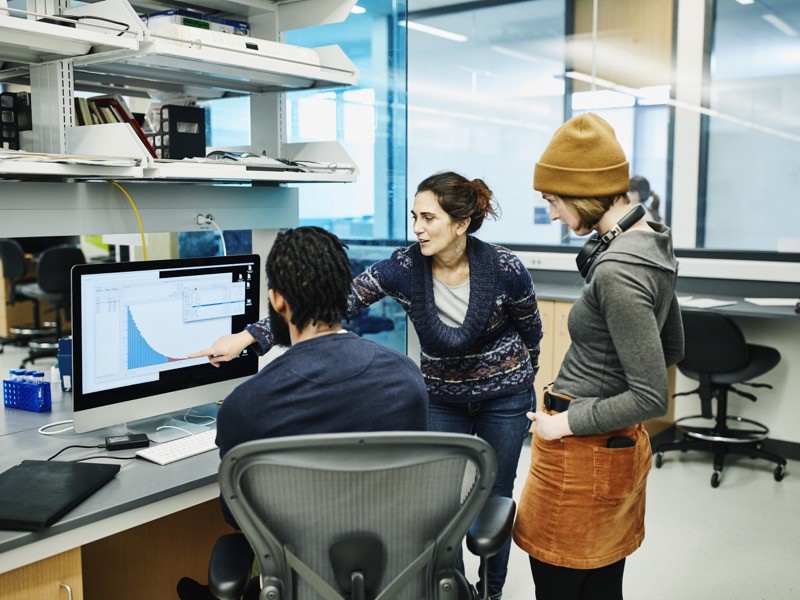In 2017, three months after starting my PhD at the Helmholtz Centre for Environmental Research (UFZ) in Leipzig, Germany, I joined the centre’s group representing doctoral researchers after I attended its annual Christmas meeting. I had originally gone along to meet other doctoral researchers outside my department and to socialize with new colleagues, but quickly found myself being elected as a representative for the group.
Institutes around the world have many forms of doctoral representation. The Helmholtz Association consists of 19 centres, and each has its own local group and 2 elected PhD representatives. These groups are connected in a Helmholtz-wide network. Similar networks in Germany exist for the Max Planck Society and the Leibniz Association, but seldom for universities. My group is part of a wider network of doctoral representatives called the Helmholtz Juniors, who are spread across the 19 centres. At the 2018 Helmholtz Juniors annual meeting in Kiel, I noticed how we faced similar challenges across the association, such as the lack of social-security funds for health care, pensions and so on — something often faced by stipend holders. During this meeting, I learnt more about thinking and working on a larger scale.
The Helmholtz Juniors is relatively unusual in its size and scope: Germany tends to have relatively sophisticated doctoral representation groups compared with other countries. Yet opportunities to represent doctoral researchers exist in many institutions, whether that’s as an elected representative for a specific department, institute or university, or a salaried position in a career-development office.
Each Helmholtz centre usually sends two elected representatives to one of four working groups, which respectively focus on communication, working conditions, events and the biennial survey. The first survey was conducted in 2008, and assessed the status quo and identified potential improvements to working conditions. We make improvements by sharing examples of best practice across different institutions, such as dealing with conflicts at a local level or ways to integrate new doctoral researchers into the institute during the COVID-19 lockdowns. We also work with the Helmholtz Association and its president, centre directors, works councils and others to suggest improvements at a Helmholtz-wide level. For example, my research centre adopted a recommended salary increase to €1,700 (US$2,000) per month for doctoral positions after discussing the Helmholtz Juniors 2017 survey results with all stakeholders.
Together, the Helmholtz Juniors plan events, collect data and strive to improve working conditions for doctoral researchers. In 2020, I was elected as spokesperson for the Helmholtz Juniors, representing more than 8,000 of my peers. I’ve picked up skills that are not often learnt during a PhD programme, such as how to motivate people and tackle challenges in a team.
During the pandemic, normal ways of communicating and getting to know new representatives have not been possible. This has forced me to branch out and be creative. The Helmholtz Juniors’ work is mostly online because the centres are spread all over Germany, but we normally have an in-person annual meeting. Translating this to an online version, held this month, resulted in a very different experience, with virtual workshops, social nights and question-and-answer sessions throughout January instead of the conventional, intense, two-day meeting.
Recently, I noticed how I work differently since becoming a spokesperson for the Helmholtz Juniors: I delegate tasks and prioritize jobs by setting aside things that don’t have to be done immediately, so I can move on to something else. I didn’t always find it easy to coordinate teams, attend extra meetings, plan events or projects in addition to my doctoral project. Taking on extra work did me good. At the start of my PhD, I found it difficult to disentangle myself from my research. By tackling other projects, I could channel a nagging guilt that I should be doing something important into an alternative project, which gave me a break and a rest from science.
It is important for me to distance myself from my research and to put my mental health above it. I hadn’t realized how much the ups and downs of scientific research during my first year had affected me. For this reason, I also started a mental-health awareness campaign with the Helmholtz working-conditions team that ran in October 2020.
Overall, participating in a group representing doctoral researchers helped me and my sense of purpose immensely. Through the Helmholtz Juniors, I connected with so many interesting PhD researchers from all over the world who are working on different research fields and topics. The volunteer work helped me to hone my organizational and leadership skills. Striving for and eventually implementing change is a rewarding experience. I hope I can motivate you to join a group representing doctoral researchers at your institution, and change academia one step at a time.
This is an article from the Nature Careers Community, a place for Nature readers to share their professional experiences and advice. Guest posts are encouraged.

